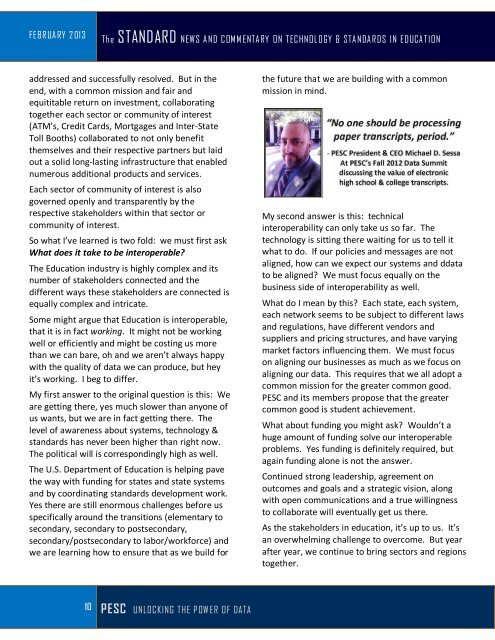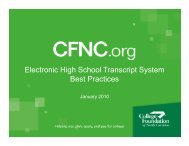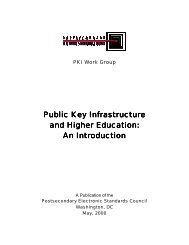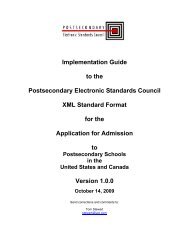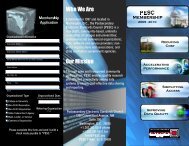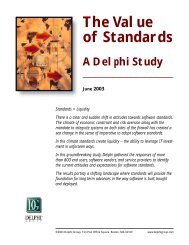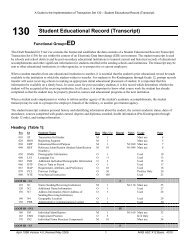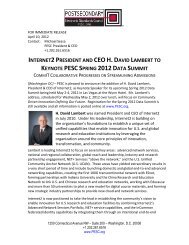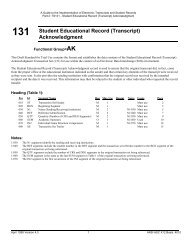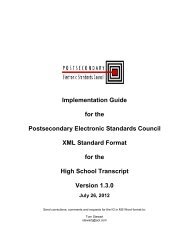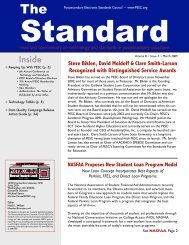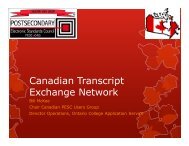February 2013 - PESC
February 2013 - PESC
February 2013 - PESC
Create successful ePaper yourself
Turn your PDF publications into a flip-book with our unique Google optimized e-Paper software.
FEB RUA RY 2 013<br />
Th e STANDARD NEWS A ND C OM M ENTA RY ON T EC HNOL OGY & STA NDA RDS IN EDUCA T ION<br />
addressed and successfully resolved. But in the<br />
end, with a common mission and fair and<br />
equititable return on investment, collaborating<br />
together each sector or community of interest<br />
(ATM’s, Credit Cards, Mortgages and Inter-State<br />
Toll Booths) collaborated to not only benefit<br />
themselves and their respective partners but laid<br />
out a solid long-lasting infrastructure that enabled<br />
numerous additional products and services.<br />
Each sector of community of interest is also<br />
governed openly and transparently by the<br />
respective stakeholders within that sector or<br />
community of interest.<br />
So what I’ve learned is two fold: we must first ask<br />
What does it take to be interoperable?<br />
The Education industry is highly complex and its<br />
number of stakeholders connected and the<br />
different ways these stakeholders are connected is<br />
equally complex and intricate.<br />
Some might argue that Education is interoperable,<br />
that it is in fact working. It might not be working<br />
well or efficiently and might be costing us more<br />
than we can bare, oh and we aren’t always happy<br />
with the quality of data we can produce, but hey<br />
it’s working. I beg to differ.<br />
My first answer to the original question is this: We<br />
are getting there, yes much slower than anyone of<br />
us wants, but we are in fact getting there. The<br />
level of awareness about systems, technology &<br />
standards has never been higher than right now.<br />
The political will is correspondingly high as well.<br />
The U.S. Department of Education is helping pave<br />
the way with funding for states and state systems<br />
and by coordinating standards development work.<br />
Yes there are still enormous challenges before us<br />
specifically around the transitions (elementary to<br />
secondary, secondary to postsecondary,<br />
secondary/postsecondary to labor/workforce) and<br />
we are learning how to ensure that as we build for<br />
the future that we are building with a common<br />
mission in mind.<br />
My second answer is this: technical<br />
interoperability can only take us so far. The<br />
technology is sitting there waiting for us to tell it<br />
what to do. If our policies and messages are not<br />
aligned, how can we expect our systems and ddata<br />
to be aligned? We must focus equally on the<br />
business side of interoperability as well.<br />
What do I mean by this? Each state, each system,<br />
each network seems to be subject to different laws<br />
and regulations, have different vendors and<br />
suppliers and pricing structures, and have varying<br />
market factors influencing them. We must focus<br />
on aligning our businesses as much as we focus on<br />
aligning our data. This requires that we all adopt a<br />
common mission for the greater common good.<br />
<strong>PESC</strong> and its members propose that the greater<br />
common good is student achievement.<br />
What about funding you might ask? Wouldn’t a<br />
huge amount of funding solve our interoperable<br />
problems. Yes funding is definitely required, but<br />
again funding alone is not the answer.<br />
Continued strong leadership, agreement on<br />
outcomes and goals and a strategic vision, along<br />
with open communications and a true willingness<br />
to collaborate will eventually get us there.<br />
As the stakeholders in education, it’s up to us. It’s<br />
an overwhelming challenge to overcome. But year<br />
after year, we continue to bring sectors and regions<br />
together.<br />
10 <strong>PESC</strong> UNLOC K ING T HE P OW ER OF DATA


